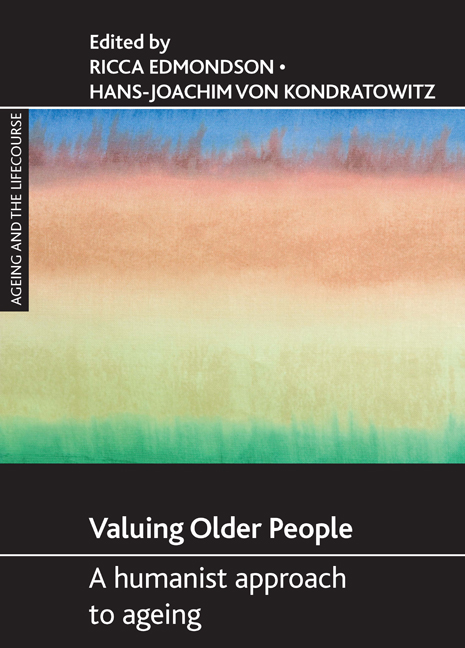Book contents
- Frontmatter
- Contents
- List of tables and figures
- Notes on contributors
- Acknowledgements
- Foreword
- Introduction
- Part One Religion, spirituality, cultural resources and creating meaning
- Part Two Norms, values and gerontology
- Part Three Ageing and wisdom? Conflicts and contested developments
- Afterwords
- Index
- Available titles in the Ageing and the Lifecourse series
four - Atheist convictions, Christian beliefs or ‘keeping things open’? Patterns of world views among three generations in East German families
Published online by Cambridge University Press: 05 July 2022
- Frontmatter
- Contents
- List of tables and figures
- Notes on contributors
- Acknowledgements
- Foreword
- Introduction
- Part One Religion, spirituality, cultural resources and creating meaning
- Part Two Norms, values and gerontology
- Part Three Ageing and wisdom? Conflicts and contested developments
- Afterwords
- Index
- Available titles in the Ageing and the Lifecourse series
Summary
Introduction
In the past in Europe, as it is in the present in many parts of the world, attachment to religion has been part of the accepted image of older people. Religious ideas have been important vehicles for making sense of profound questions dealing with life and death, and their association with religiosity has had significant, if varied, effects on older people's relations with younger people and with society at large. What, then, are the ideas exchanged on these topics in societies where religion plays very little part? This chapter explores attitudes to death and the afterlife among three generations in East German families.
One of the most highly secularised parts of the world, East Germany is a region where Christian traditions have largely vanished and most people have grown up without a religious socialisation. Although the secularisation process was imposed mainly by the dominant political party, it succeeded in creating secular mindsets and atheist convictions throughout the population. People from different generations played different roles in this process. Some had to decide whether to give up or to maintain their religious affiliation, whereas others were fully socialised within the new a-religious framework. After the socialist regime ended, the conditions for adopting religious perspectives changed significantly. Today, the religious change that can be observed is not a simple religious revival; it is an inchoate reawakening of religious perspectives that is experimental and syncretistic rather than traditional and church-bound. Ideas about the afterlife are a significant part of this religious reawakening and these ideas are adopted mainly by younger generations. In some families, we observed a process of inverse socialisation, in which young people introduced new religious perspectives to their older family members.
Enforced secularisation in the German Democratic Republic
In East Germany, a virtually unique break with religious tradition took place during the time of the German Democratic Republic (GDR). In 1949, the founding year of the GDR, 91% of the population belonged to one of the two major Christian congregations; in 1989 only 29% did. Since then, church membership has dropped even further. Today, only 21% of the population in the new states of a unified Germany are members of the Protestant Church and only 4% are members of the Catholic Church (Pollack, 2000: 19).
- Type
- Chapter
- Information
- Valuing Older PeopleA Humanist Approach to Ageing, pp. 73 - 90Publisher: Bristol University PressPrint publication year: 2009



